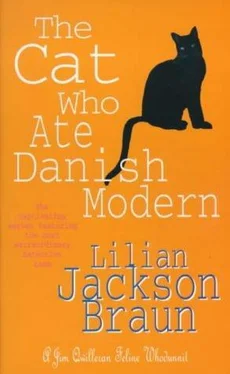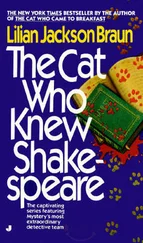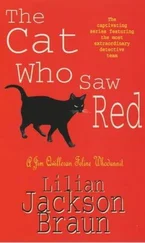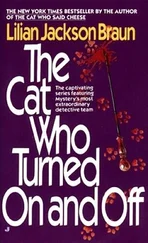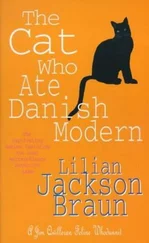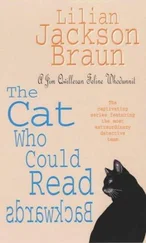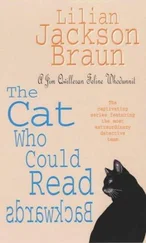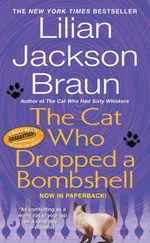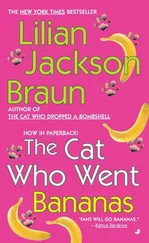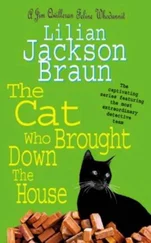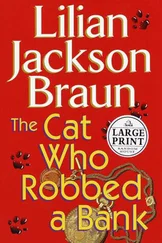Lillian Braun - The Cat Who Ate Danish Modern
Здесь есть возможность читать онлайн «Lillian Braun - The Cat Who Ate Danish Modern» весь текст электронной книги совершенно бесплатно (целиком полную версию без сокращений). В некоторых случаях можно слушать аудио, скачать через торрент в формате fb2 и присутствует краткое содержание. Жанр: Классический детектив, на английском языке. Описание произведения, (предисловие) а так же отзывы посетителей доступны на портале библиотеки ЛибКат.
- Название:The Cat Who Ate Danish Modern
- Автор:
- Жанр:
- Год:неизвестен
- ISBN:нет данных
- Рейтинг книги:5 / 5. Голосов: 1
-
Избранное:Добавить в избранное
- Отзывы:
-
Ваша оценка:
- 100
- 1
- 2
- 3
- 4
- 5
The Cat Who Ate Danish Modern: краткое содержание, описание и аннотация
Предлагаем к чтению аннотацию, описание, краткое содержание или предисловие (зависит от того, что написал сам автор книги «The Cat Who Ate Danish Modern»). Если вы не нашли необходимую информацию о книге — напишите в комментариях, мы постараемся отыскать её.
The Cat Who Ate Danish Modern — читать онлайн бесплатно полную книгу (весь текст) целиком
Ниже представлен текст книги, разбитый по страницам. Система сохранения места последней прочитанной страницы, позволяет с удобством читать онлайн бесплатно книгу «The Cat Who Ate Danish Modern», без необходимости каждый раз заново искать на чём Вы остановились. Поставьте закладку, и сможете в любой момент перейти на страницу, на которой закончили чтение.
Интервал:
Закладка:
Moodily, Qwilleran sat at his desk and stared at his typewriter. He should have been working. He should have been shooting for the next deadline, but something was bothering him. It was the timing of the burglary.
The magazine had been distributed Saturday evening. It was some time during the following night — late Sunday or early Monday — that the burglary occurred. Within a matter of twenty-four short hours, Qwilleran figured, someone had to (a) read the description of the jades and (b) dream up the idea of stealing them and (c) make elaborate preparations for a rather complex maneuver. They had to devise a plan of entering the house without disturbing family or servants, work out a method of silent access to the ingeniously designed glass-covered niches, arrange for fairly careful packing of the loot, provide a means of transporting it from the house, and schedule all this so as to elude the private police. Undoubtedly Muggy Swamp had private police patrolling the community.
There had been very little time for research, Qwilleran reflected. It would require a remarkably efficient organization to carry out the operation successfully… unless the thieves were acquainted with the Tait house or had advance knowledge of the jade story. And if that was the case, had they deliberately timed the burglary to make Gracious Abodes look bad?
As Qwilleran pondered the possibilities, the first edition of the Monday Fluxion came off the presses, and the copyboy whizzed through the Feature Department, tossing a paper on each desk.
The Tait incident was discreetly buried on page four, and it bore an astounding headline. Qwilleran read the six short paragraphs in six gulps. The by-line was Lodge Kendall's; he was the Fluxion's regular man at Police Headquarters.
There was no reference to the Gracious Abodes story. The estimated value of the stolen jades was omitted. And there was an incredible statement from the Police Department. Qwilleran read it with a frown, then grabbed his coat and headed for the Press Club.
The Press Club occupied a soot-covered lime- stone fortress that had once been the county jail. The windows were narrow and barred, and mangy pigeons roosted among the blackened turrets. Inside, the old wood-paneled walls had the lingering aroma of a nineteenth-century penal institution, but the worst feature was the noise. Voices swooped across the domed ceiling, collided with other voices, and bounced back, multiplying into a deafening roar. To the newsmen this was heaven.
Today the cocktail bar on the main floor resounded with discussion and speculation on the happening in Muggy Swamp. Jewel thefts were crimes that civilized newsmen could enjoy with relish and good conscience. They appealed to the intellect, and as a rule nobody got hurt.
Qwilleran found Odd Bunsen at that end of the bar traditionally reserved for Fluxion staffers. He joined him and ordered a double shot of tomato juice on the rocks.
"Did you read it?" he asked the photographer.
"I read it," said Bunsen. "They're nuts." They talked in subdued tones. At the opposite end of the mahogany bar the voices of Morning Rampage staffers suggested undisguised jubilation. Qwilleran glanced with annoyance at the rival crew.
"Who's that guy down there in the light suit — the one with the loud laugh?" he demanded.
"He works in their Circulation Department," Bunsen said. "He played softball against us this summer, and take my word for it — he's a creep." "He irritates me. A woman is dead, and he's crowing about it." "Here comes Kendall," said the photographer. "Let's see what he thinks about the police theory." The police reporter — young, earnest, and happy in his work — was careful to exhibit a professional air of boredom.
Qwilleran beckoned him to the bar, and said, "Do you believe that stuff you wrote this morning?" "As far as the police are concerned," said Kendall, "it's an open-and-shut case. It had nothing to do with your publication of the Tait house. It had to be an inside job. Somebody had to know his way around." "I know," said Qwilleran. "That's what I figured. But I don't like their choice of suspect. I don't believe the houseboy did it." "Then how do you explain his disappearance? If Paolo didn't swing with the jades and take off for Mexico, where is he?" Bunsen said: "Paolo doesn't fit the picture. He was a nice kid — quiet and shy — very anxious to help. He's not the type." "You photographers think you're great judges of character," Kendall said. "Well, you're wrong! According to Tait, the boy was lazy, sly, and deceitful. On several occasions Tait threatened to fire him, but Mrs. Tait always came to Paolo's defense. And because of her physical condition, her husband was afraid to cross her." Bunsen and Qwilleran exchanged incredulous glances, and Kendall wandered away to speak to a group of TV men.
For a while Qwilleran toyed with the jade but- ton that Tait had given him. He kept it in his pocket with his loose change. Finally he said to Bunsen, "I called David Lyke this morning." "How's he taking it?" "He didn't seem vitally upset. He said the jades were insured and Mrs. Tait was a miserable creature who made her husband's life one long hell." "I'll buy that. She was a witch-and-a-half. What did he think about Paolo being mixed up in it?" "At the time I talked to Lyke, that hadn't been announced. " Bruno, the Press Club bartender, was hovering in the vicinity, waiting for the signal.
"No more," Qwilleran told him. "I've got to eat and get back to work." "I saw your magazine yesterday," the bartender said. "It gave me and my wife a lot of decorating ideas. We're looking forward to the next issue." "After what happened in Muggy Swamp, you may never see a next issue," Qwilleran said. "Nobody will want to have his house published." Bruno gave the newsman a patronizing smile. "Maybe I can help you. If you're hard up for material, you can photograph my house. We did it ourselves." "What kind of place have you got?" Qwilleran waited warily for the answer. Bruno was known as the poor man's Leonardo da Vinci. His talents were many, but slender.
"I have what they call a monochromatic color scheme," said the bartender. "I've got Chartreuse carpet, Chartreuse walls, Chartreuse drapes, and a Chartreuse sofa." "Very suitable for a member of your profession," said Qwilleran, "but allow me to correct you on one small detail.
We never call draperies drapes."
5
Before going to the cocktail party at David Lyke's apartment, Qwilleran went home to change clothes and give the cat a slice of corned beef he had bought at the delicatessen.
Koko greeted him by flying around the room in a catly expression of joy — over chairs, under tables, around lamps, up to the top of the bookshelves, down to the floor with a thud and a grunt — making sharp turns in midair at sixty miles an hour. Lamps teetered. Ashtrays spun around. The limp curtains rippled in the breeze. Then Koko leaped on the dictionary
and scratched for all he was worth-with his rear end up, his front end down, his tail pointed skyward, like a toboggan slide with a flag on top. He scratched industriously, stopped to look at Qwilleran, and scratched again.
"No time for games," Qwilleran said. "I'm going out. Cocktail party. Maybe I'll bring you home an olive." He put on a pair of pants that had just come from the cleaner, unpinned a newly purchased shirt, and looked for his new tie. He found it draped over the arm of the sofa. There was a hole in it, center front, and Qwilleran groaned. That left only one plaid tie in good condition. He whipped it off the doorknob where it hung and tied it around his neck, grumbling to himself. Meanwhile, Koko sat on the dictionary, hopefully preparing for a game.
"No game tonight," Qwilleran told him again. "You eat your corned beef and then have a nice long nap." The newsman set out for the party with three- fold anticipation. He hoped to make some useful contacts; he was curious about the fashionable and expensive Villa Verandah; and he was looking forward to seeing David Lyke again. He liked the man's irreverent attitude. Lyke was not what Qwilleran had expected a decorator to be. Lyke was neither precious nor a snob, and he wore his spectacular good looks with a casual grace.
Читать дальшеИнтервал:
Закладка:
Похожие книги на «The Cat Who Ate Danish Modern»
Представляем Вашему вниманию похожие книги на «The Cat Who Ate Danish Modern» списком для выбора. Мы отобрали схожую по названию и смыслу литературу в надежде предоставить читателям больше вариантов отыскать новые, интересные, ещё непрочитанные произведения.
Обсуждение, отзывы о книге «The Cat Who Ate Danish Modern» и просто собственные мнения читателей. Оставьте ваши комментарии, напишите, что Вы думаете о произведении, его смысле или главных героях. Укажите что конкретно понравилось, а что нет, и почему Вы так считаете.
